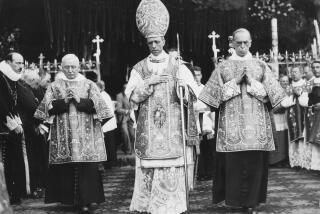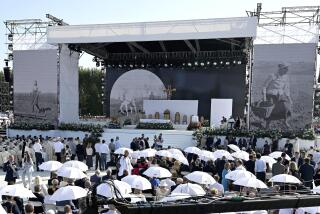Move to Beatify Nazi Victim Upsets Jews
- Share via
COLOGNE, West Germany — Pope John Paul II begins his second trip to West Germany today, and one of the first things on his schedule involves a highly charged religious issue.
This is the beatification ceremony here Friday for Sister Theresa, a nun who was killed in the Nazi death camp at Auschwitz in 1942.
Sister Theresa was born a Jew named Edith Stein. She declared herself an atheist and then, at age 30, became a Roman Catholic. The question has been raised whether she was executed for being a Catholic or a Jew.
The Vatican maintains that she suffered martyrdom for her Catholic faith and thereby deserves to be beatified as a step toward canonization.
Father Ambrosius Eszer, the Vatican official directing the sainthood process, says she “was killed to punish the Catholic Church.”
But Shulamit Aloni, a member of the Knesset, Israel’s Parliament, said recently that the beatification of the Carmelite nun would be an insult to Jews.
“We interpret it as a provocation and an insult because 1 million children died in Auschwitz,” Aloni said, “and they take a woman and beatify her because she became a Catholic. It’s clearly degrading and humiliating to Jews.”
Tullia Zevi, president of the Union of Italian-Jewish Communities in Rome, said:
“If she was a martyr, then 6 million Jews were martyrs. While beatification is an internal church affair, this particular case has caused concern in Jewish circles because of its implications. A dialogue between two religions should be conducted among partners having equal dignity. . . . This shows a lack of sensitivity.”
Edith Stein was born in 1891 to a well-to-do Jewish family in Breslau (now a part of Poland and known as Wroclaw). She studied philosophy at the University of Gottingen and earned a doctorate.
She became an atheist, but in 1922, inspired by a biography of St. Teresa of Avila, she was baptized as a Catholic and, 11 years later, entered a Carmelite convent in Cologne.
In 1938, she wrote to Pope Pius XII and urged him to condemn the Nazis for the attack on Jewish synagogues and business places in an event known as the “Crystal Night.”
Not long afterward, her order sent her to Echt, in the Netherlands, where it was thought she would be safer than in Germany.
In 1940, however, the Germans occupied the Netherlands. Two years later, the Dutch Catholic bishops protested the Nazi authorities’ transporting of Jews to concentration camps in Eastern Europe. In reprisal, the Germans ruled that Jewish converts to Catholicism were to be seized and sent to the camps.
On Aug. 2, 1942, Sister Theresa was arrested at the Carmelite convent in Echt, along with her sister Rosa. A week later, they were both dead, gassed at Auschwitz.
Catholic authorities say that sainthood for Sister Theresa was recommended not just because of her execution but because of her pious life, her religious writings and her good works.
But some Jews object to the possible canonization of a nun who in her will, according to a 1983 biography by Romaeus Leuven, said:
“I asked the Lord that he accept my life and death in his honor and glorification . . . especially for the preservation and fulfillment of our holy order, namely the Cologne and Echt Carmelites, for the sins of the unbelieving Jewish people. . . .”
Last month, a group of Jewish leaders asked the Vatican not to emphasize, in the ceremony at Cologne, the nun’s remarks about “the unbelieving Jewish people.”
Ulrich von Hehl, head of the Historical Commission Office in Bonn, wrote recently in the newspaper Frankfurter Allgemeine:
“She was murdered because she was a Jew. Her conversion to Catholicism changes nothing about that. But it cannot be overlooked that her arrest and deportation was part of a quick move for revenge against Catholic Jews in the Netherlands.”
Hehl says in his book, “Priests Under Hitler’s Terror,” that about 8,000 priests were persecuted by the Nazis and that 159 were killed.
One of these, Father Rupert Mayer, who spent the war in a concentration camp, will be beatified by John Paul in Munich on Sunday.
More to Read
Sign up for Essential California
The most important California stories and recommendations in your inbox every morning.
You may occasionally receive promotional content from the Los Angeles Times.










